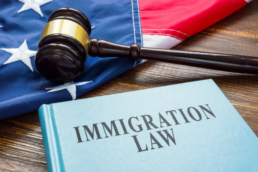A foreign national living abroad will typically start the family-based or marriage-based green card process by filing a Form I-130 petition with United States Citizenship & Immigration Services (USCIS). This petition will typically pend for about 6-12 months (subject to change) before an approval is issued.
Once this petition is approved by USCIS, the application will be sent to the National Visa Center, which will collect additional materials in support of the application before a final visa interview is scheduled at the Embassy or Consulate. Following a successful interview, the individual will be issued an “Immigrant Visa” in their passport and will enter the U.S. as a permanent resident.
Exceptional Circumstances
In certain situations, a foreign national can avoid filing the Form I-130 petition with USCIS and can instead file the petition directly with a U.S. Embassy in his or her country. We call this “Direct Consular Filing.” This process is generally significantly faster than filing the Form I-130 petition with USCIS; here, it often takes only 1-2 months to get approval by the Embassy.
The following pre-conditions must generally be met: (1) the U.S. Citizen petitioner and beneficiary are both living outside the U.S. and meet specific requirements of physical presence and residence in a foreign country and (2) the request to file is based on “exceptional circumstances.” Please note that some U.S. Embassies in certain countries do allow the U.S. citizen petitioner to reside in the U.S. throughout this process.
The following are examples of the types of exceptional circumstances that may warrant an exception to the general I-130 filing process:
- U.S. military deployment or transfer: A U.S. service member overseas becomes aware of a new deployment or transfer with very little notice.
- Medical emergencies: A petitioner or beneficiary is facing an urgent medical emergency that requires immediate travel. This may include a situation where the beneficiary is pregnant and delaying travel may create medical risk or extreme hardship for the mother or child.
- Threats to personal safety: A petitioner or beneficiary is facing an imminent threat to their personal safety.
- Close to aging out: A beneficiary is within a few months of aging out of eligibility for the immigrant visa.
- Petitioner has recently naturalized as a U.S. citizen: The petitioner and family have traveled for the immigrant visa interview, but the petitioner has naturalized and the family member(s) requires a new, stand-alone petition.
- Adoption of a child: A petitioner who has adopted a child locally and has an imminent need to depart the country. This exception should only be considered if the child has been in the petitioner’s legal and physical custody for at least two years and the petitioner has a full and final adoption decree on behalf of the child.
- Short notice of position relocation: A U.S. Citizen petitioner, living and working abroad, who receives a job relocation within the same company or subsidiary to the United States, or an offer of a new job in the United States with very little notice.
Process
Applicants must first reach out to their respective U.S. Embassy with an explanation of the exceptional circumstances that would warrant acceptance and processing of the Form I-130 Petition at the Embassy. They should generally attach evidence of exceptional circumstances, evidence of the petitioner’s US. citizenship, proof that both the petitioner and beneficiary reside abroad in the same foreign country, a marriage certificate or birth certificate, and the beneficiary’s passport biodata page. The Immigrant Visa Unit will then make a final determination on whether the exceptional circumstance exists.
If the request is accepted by the Immigrant Visa Unit, the petitioner will be contacted to submit Form I-130 and supporting documents in person (or sometimes, by mail). Once the I-130 petition is approved, all documents must then be submitted for an Immigrant Visa Application. An appointment will be scheduled, and following a successful interview, the beneficiary will receive an “immigrant visa” in his or her passport and will enter the U.S. as a Permanent Resident.
Final Notes
Not all U.S. Embassies and Consulates abroad offer the Direct Consular Filing procedure. If you have questions about whether your country of citizenship or residence offers this benefit, please contact our office. We would be happy to assist you!
Ready to have Berardi on your side?
Whether you’re a business looking to hire or a professional hoping to relocate, immigration law can be complicated. But you don’t have to do it alone. Put our experience to work for you.



